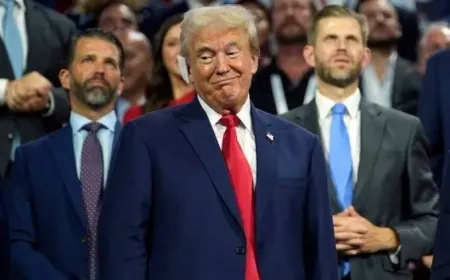Wall Street Calls Senate Crypto Bill the Most Important Regulation Since 1930
Wall Street backs the Senate’s crypto bill giving the CFTC control of Bitcoin and Ether trading, calling it the most important reform in decades.

Key Highlights of the Senate Crypto Bill
Bitcoin and Ethereum would be classified as digital commodities regulated by the Commodity Futures Trading Commission (CFTC).
Crypto exchanges, brokers, and custodians must register as Digital Commodity Exchanges (DCEs) under federal law.
Customer funds must be kept separate from company assets and verified through regular audits.
Only tokens with transparent and stable markets can be listed for trading to limit manipulation and fraud.
The CFTC and SEC will divide responsibilities — the CFTC for commodities, the SEC for securities tokens.
Registered entities will pay licensing and compliance fees to support CFTC supervision.
Trading, custody, and brokerage functions must operate as independent units to prevent conflicts of interest.
The Agriculture and Banking Committees will merge their drafts before sending the final bill to the Senate floor.
Washington — A bipartisan U.S. Senate bill that would give federal regulators direct authority over Bitcoin and Ethereum trading is being described by Wall Street executives and crypto leaders as the most important piece of financial legislation in nearly a century.
On November 10, the Senate Agriculture Committee released a proposal that would formally place digital commodities such as Bitcoin (BTC) and Ethereum (ETH) under the Commodity Futures Trading Commission (CFTC). The bill was written by Sen. John Boozman (R-Ark.) and Sen. Cory Booker (D-N.J.) and lays out new national standards for how cryptocurrencies are traded, stored, and safeguarded.
“This is the clearest roadmap yet for how traditional financial institutions can engage with digital assets,” said Cody Carbone, CEO of the Digital Chamber, in an interview with CNBC. “It tells businesses exactly what’s expected of them, rather than leaving them guessing.”
CFTC to Regulate Bitcoin and Ether Trading
Under the draft, the CFTC would oversee trading platforms that deal in Bitcoin and Ether — classifying both as digital commodities. Crypto exchanges would be required to register as Digital Commodity Exchanges (DCEs) and follow federal rules on asset custody, accounting, and customer protection.
The proposal would also separate trading, brokerage, and custody activities within exchanges — a structure designed to prevent conflicts of interest, similar to traditional banking rules. The Securities and Exchange Commission (SEC)would retain authority over tokens considered securities, while both agencies would collaborate on shared areas such as disclosure and reporting.
If enacted, the new system would end years of jurisdictional disputes between the CFTC and SEC, which have left the U.S. crypto market in regulatory uncertainty.
White House and Banking Industry Endorse the Proposal
The draft has support from the White House and major financial institutions. President Donald Trump has called digital asset regulation “a national priority,” saying the proposal could bring stability to the industry while keeping innovation within U.S. borders.
Banking executives view the bill as a turning point for integrating crypto into the broader financial system. Brian Moynihan, CEO of Bank of America, said clear rules would allow banks to handle crypto transactions with confidence. “Once there’s legal clarity, financial institutions will finally be able to offer regulated services for digital assets,” he said.
Brian Armstrong, CEO of Coinbase, said his firm has met with lawmakers from both parties to discuss the bill. “There’s rare bipartisan agreement on this,” Armstrong said. “Everyone understands that digital assets are too big to ignore, and this gives the market a path forward.”
Bill Imposes Strict Trading and Disclosure Standards
The Senate draft requires crypto trading platforms to separate customer assets from company funds, maintain transparent order books, and record all trades for regulatory review.
Exchanges would need to publish clear, standardized disclosures on pricing, custody arrangements, and the handling of user deposits — similar to those required of registered futures and stock exchanges.
The CFTC would conduct periodic audits and require independent verification of reserves to prevent misuse of client assets, a key issue highlighted by the collapse of FTX and other exchanges.
The proposal also limits which tokens can be listed for trading. Exchanges could only offer assets that are proven to have stable markets and limited potential for manipulation. That provision is aimed at curbing speculative tokens and preventing schemes such as wash trading and artificial volume inflation.
To finance its expanded supervision, the bill allows the CFTC to collect registration and examination fees from approved digital commodity exchanges.
Together, these measures would replace the fragmented self-regulation that dominates crypto trading today with a standardized federal rulebook modeled on existing commodity and futures laws.
Senate Committees to Align Crypto Rules Before Year-End
The Agriculture Committee’s digital asset draft will move next to joint review with the Senate Banking Committee, which is preparing a separate bill covering digital tokens that qualify as securities. Staff from both panels are already reconciling overlapping sections to produce a single text for floor debate.
Lawmakers involved in the talks said the goal is to finalize language before the end of 2025 so the proposal can reach the full Senate early next year. The combined version will spell out how responsibilities are divided between the Commodity Futures Trading Commission (CFTC) and the Securities and Exchange Commission (SEC) — an issue that has stalled crypto regulation for more than five years.
If the committees agree on the final draft, it will advance to a Senate vote and then move to the House for review. Several industry groups, including the Digital Chamber and the Blockchain Association, have already pledged support, saying the measure would give exchanges, banks, and investors the first clear federal rule set for trading digital assets in the U.S.
Also Read: Senate Proposes CFTC Regulation of Bitcoin and Ether Trading






























































